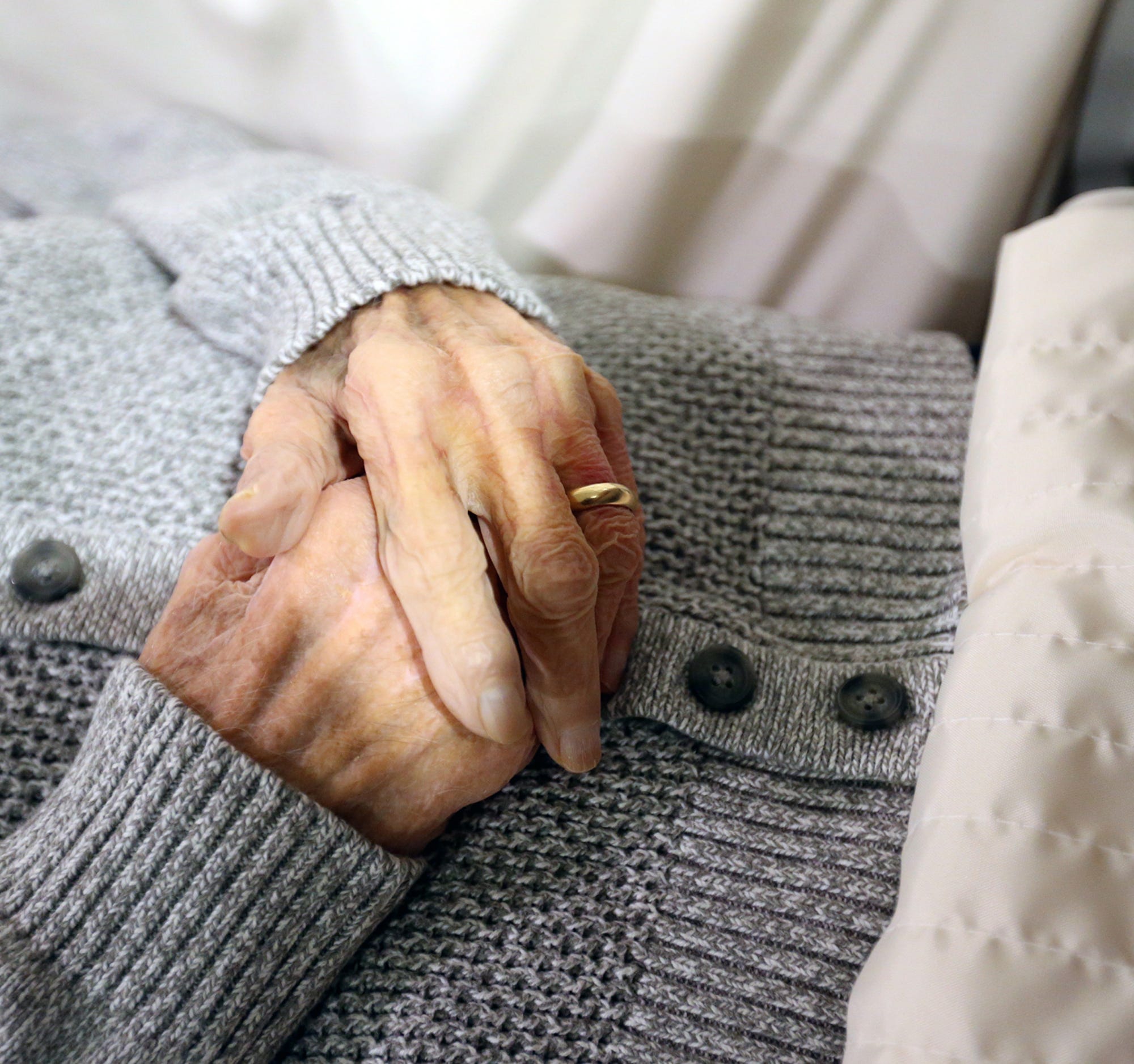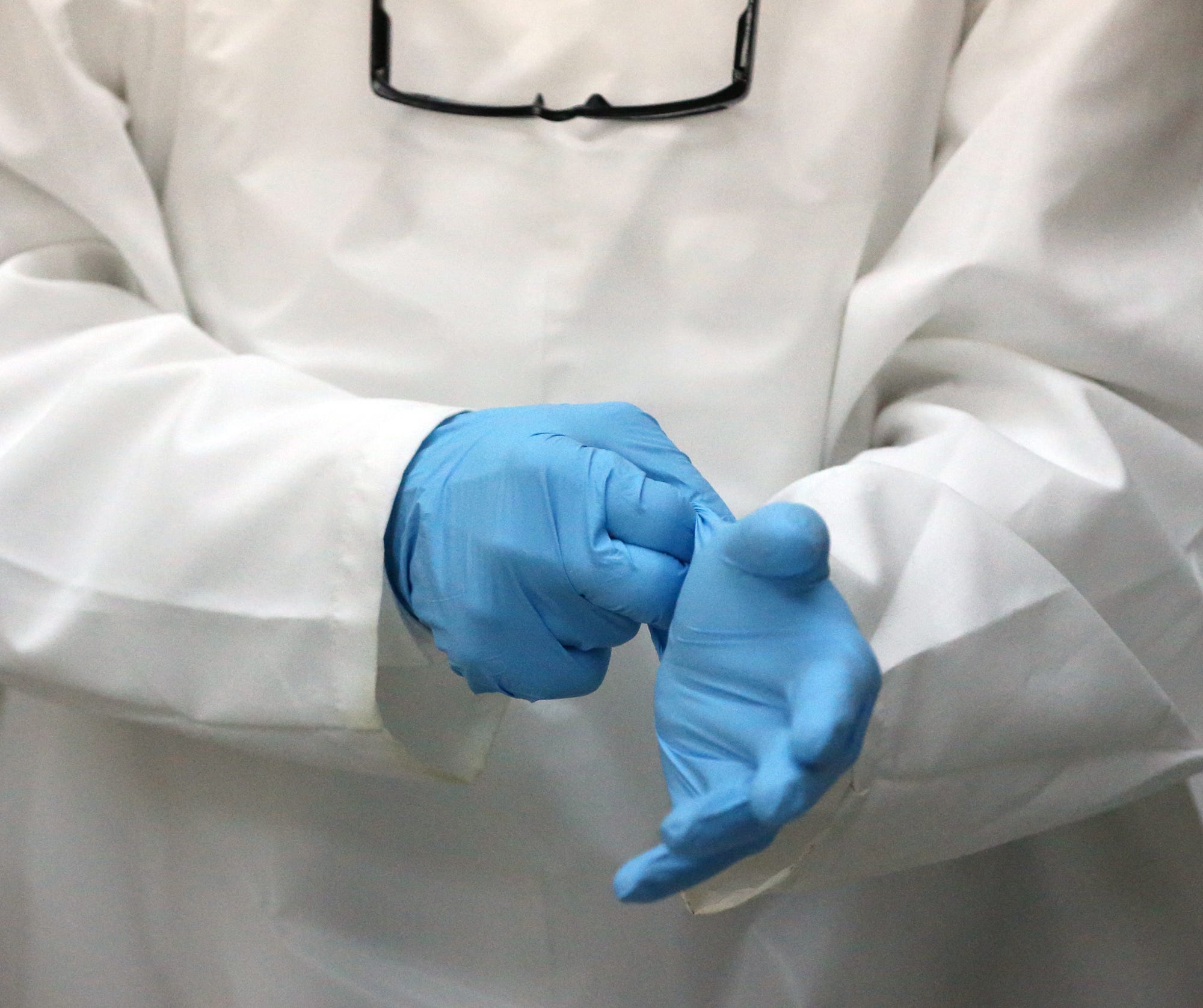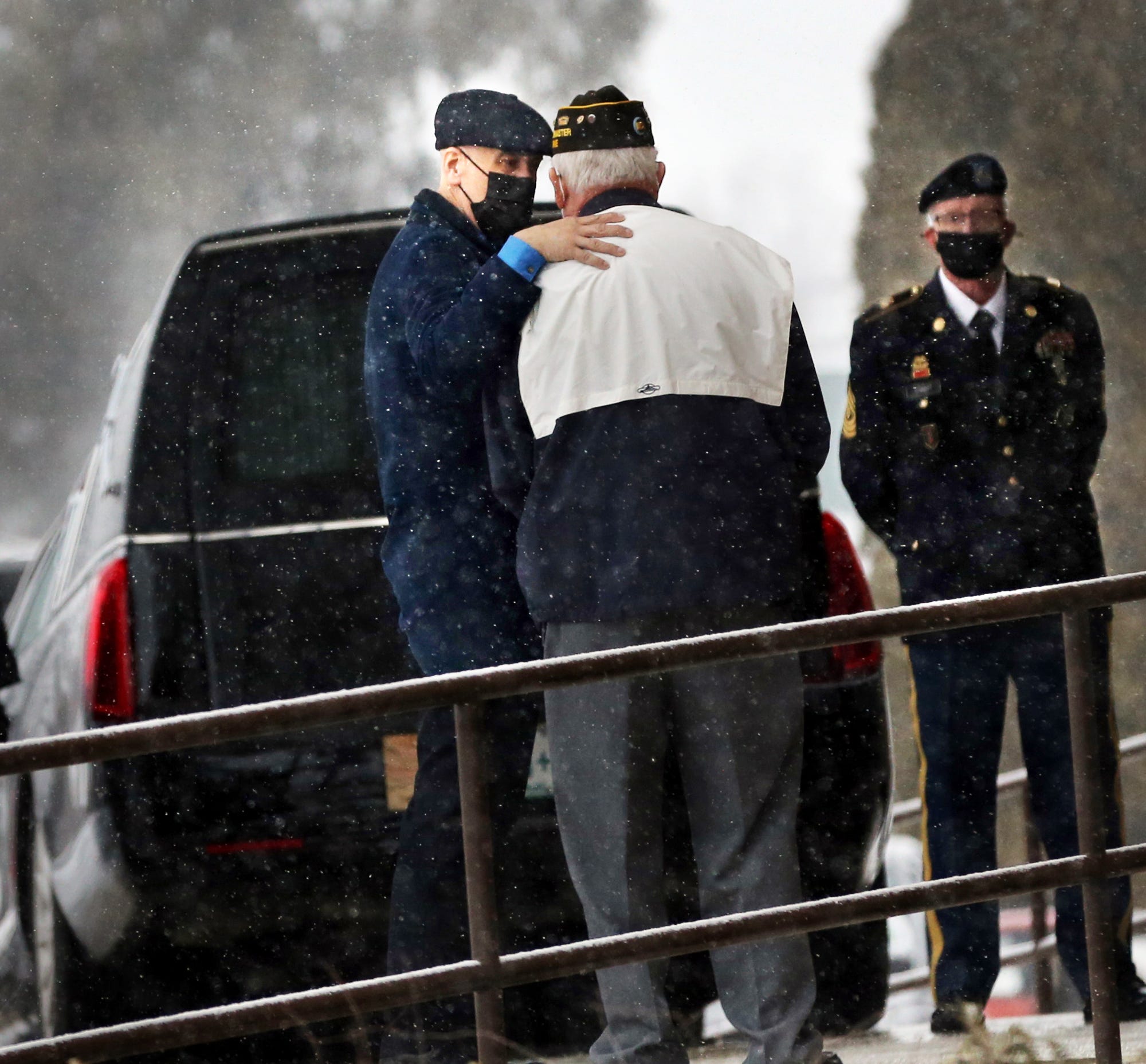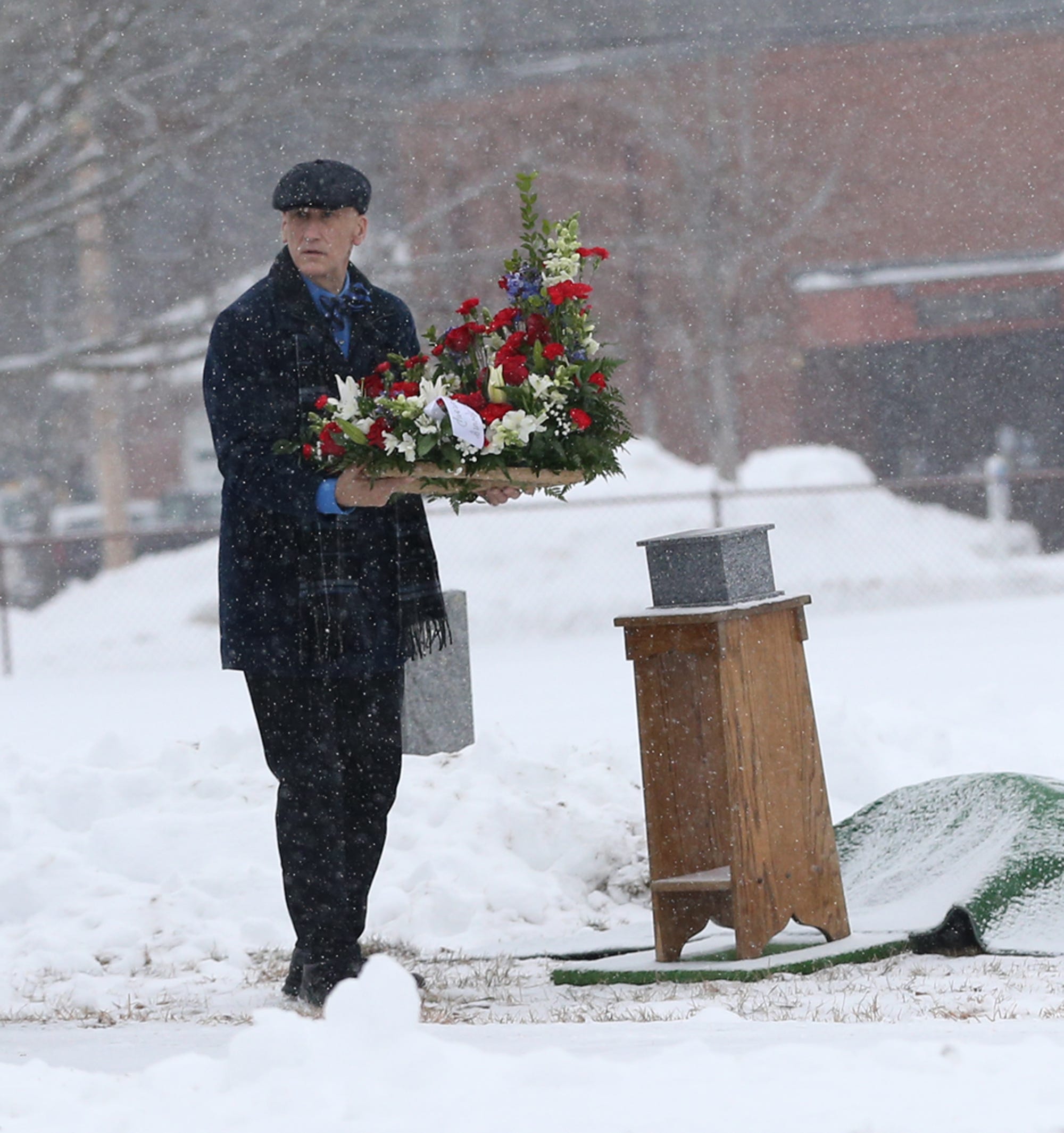KITTERY, Maine – At J.S. Pelkey and Son Funeral Home, the changes happened almost overnight.
The country’s first coronavirus cases had been identified and initial deaths reported. By March, inside the chapel, plastic covered the large mahogany cross and Roman-style pedestals, stretching across the carpet to the walls. Air conditioners stuffed the windows.
A space typically used for wakes and other services to celebrate life, the chapel was instead filled with the dead. There were upwards of 20 caskets.
Ordinarily filled with raw human feeling, the room had been transformed into a chilled, sterile environment.
“We had this big room with just people waiting to be cared for,” said Jeffrey Pelkey, the funeral home’s director. “This is a room that’s normally full of live people. It’s light, it’s bright. And then all of a sudden, that was gone. It was cold.”
Seated, Pelkey – who has been doing this job for 22 years – recently described the high-volume period that occurred months earlier, pensively adjusting his round-frame glasses.
“I literally sat down in the lobby and went, ‘Holy Moses, this is really bad,’” he said.


Long known as “last responders,” funeral home employees can be the last line of defense between a pandemic and the public. How they handle a body, Pelkey says, ultimately determines how many others are impacted by the virus.
This critical, often insufficiently acknowledged part of the public health system has been bludgeoned by the COVID-19 crisis.
One year into the pandemic, the USA TODAY Network in New England sought to document the intimacy of a funeral home director’s work amid the coronavirus.
In Pelkey, we found a story representative of the devastation – both emotional and physical – experienced by funeral directors around the country, in a business that both survives on death and has been torn apart by it. Also in Pelkey, we found resilience.
A 36-year veteran police officer, firefighter, deacon in the United Church of Christ and public safety chaplain, Pelkey joined the mortuary profession to help others in their profound times of need. A warm, ebullient man who says “being able to sit with people at the most difficult period in their life is the most important thing I can do,” Pelkey’s ability to articulate the COVID-19 crisis, starting from the very beginning, is stunning.
He’s a storyteller of the highest caliber – animated, eloquent, laden with metaphors and a flair for the dramatic.

But even he is exhausted. After the year’s onslaught of deaths, separated from both aspects of his business – from the living by virtual consultations and drive-by funerals, and from the dead through layers of PPE – his “emotional cup” has been drying up.
“I love people, I love dealing with people,” he said. “I love talking. I like learning about families.”
For a religious man, Pelkey self-admittedly has an egregious and sardonic sense of humor. Sly remarks follow nearly every other sentence, and he never misses an opportunity to make an ironic joke related to his job.
In part, it’s how he gets through his days. That, and evening jogs in the small city nearby where he serves as police and fire chaplain. He lifts weights, too, though sometimes they’re “eight ounces and filled with Scotch.”
“He’s dedicated, thorough, caring,” said Connor Martel, Pelkey’s funeral service apprentice. “He doesn’t really settle for anything less than 100%, and that’s exemplified in everything that does.”
Located in southern Maine, just minutes from the New Hampshire border, the J.S. Pelkey and Son Funeral Home sits inconspicuously on a busy road, across the street from a gas station and two-star hotel.
A hallmark of his small funeral home, Pelkey brings every deceased individual into his building through the front door. That, he said, is of utmost importance, the front door being “a symbol of equality.”
Funeral home brings body into its care
Funeral home director Jeff Pelkey always brings deceased individuals through the front door of his business as a show of dignity and equality.
Deb Cram, USA TODAY NETWORK
“For me, a measure of dignity has always been how you come in and how you go out of a building,” he said. “Paramount for funeral directors is to be an equalizer. And regardless of whatever station in life somebody comes from, whether they’re a prince or a pauper, it is incumbent upon us to be an equalizer in death and making sure that everybody receives the same level of care.”
He continued, “People deserve to come and go through the front door.”
Pelkey, who also operates Bernier Funeral Home in Somersworth, New Hampshire, says the funeral business is much more about the living than it is the dead. His staff were accustomed to spending 80% of their time with grieving families, and 20% with the deceased.
But that was before the winter of 2020.

Funeral homes knew it before anyone else, Pelkey contends.
Certainly before the Centers for Disease Control and Prevention began notifying the general public.
They knew something was happening as early as January, before COVID-19 was ever listed as a cause of death.
Pelkey, who is 54, recalled an unprecedented day, before the pandemic truly crystallized, when two elderly couples, both from local nursing homes, arrived within 24 hours.

He put all four caskets together and stared at them for a while.
“I had never experienced that,” he said.
While he won’t go against the CDC’s numbers depicting how many have died from the virus, Pelkey said the real numbers are “exponential.”
Then March came.
Just days into the initial frenzy, the U.S. Department of Homeland Security quickly classified mortuary employees as “critical infrastructure workers,” and everything about how they operated changed, sometimes mid-shift. At the beginning, there were some days when state and federal guidance changed hourly. What was the proper safety protocol at 10 a.m. was not the same by 5 p.m., Pelkey said.


Those early changes seeped into how Pelkey and his staff not only worked, but lived. Staff began sleeping at the funeral home, anticipating the phone calls. Pelkey himself spent an entire month staying in a nearby hotel, quarantining from his wife who is a trauma nurse in New Hampshire.
Per CDC guidance, he sent home staff members who were older than 60, leaving four people to do the work of nine.
Many cemeteries closed, concerned about the risk for their workers. Funeral homes became storage facilities for the dead, waiting to be buried.
“It was almost like a reality television series hit us that we didn’t sign up for,” Pelkey said.
But despite the flurry of changes around them, Pelkey has maintained his deep pride and commitment to dignity for anyone who comes into his care – dead or alive. It’s the one thing he has not allowed the virus crisis to change.
His work is completely representative of that guiding principle – his ceremoniousness, tenderness and attention to the smallest details.
“That’s one thing you can’t give up on,” he said. “You need to maintain the dignity.”

Nearly a year later, one winter morning in the funeral home’s staging room, two fiberboard boxes are blanketed by American flags — veterans waiting to be cremated.
In the embalming room – with frigid steel and bodies under glossy plastic – Pelkey points to a table organized with respirators, protective gowns and disinfectant liquids. All “COVID stuff.”
A triple layer of PPE became the standard when caring for every individual, no matter COVID-confirmed or not. Asked if he treats every individual who comes into his care as a COVID case, Pelkey answers, “Absolutely. We have to.”
The embalming process
Funeral home director Jeff Pelkey explains the process of embalming.
Deb Cram, USA TODAY NETWORK
“They could have died in a traffic crash or from a fall down the stairs. But they could have had COVID and not known.”
Scientists haven’t determined exactly how long the virus remains a threat in a body after death, but it is known that it can remain infectious on different surfaces for varying amounts of time.
The CDC says biosafety is critical “for personnel who are in contact with human remains with confirmed or suspected COVID-19.” Funeral home staff are urged to avoid unnecessary manipulation of a body that may cause air to expel from the lungs, and to perform regular, enhanced environmental decontamination.
On its face, with the U.S. crossing 500,000 COVID deaths – more than in World War I, World War II, and the Vietnam War combined – the funeral business should be booming.
In fact, it’s quite the opposite.
Beyond the industry’s new costly adaptations, record unemployment rates and increases in homelessness and food insecurity brought on by the pandemic mean many people losing loved ones can’t afford the services.
A funeral director’s makeup artistry
Funeral home director Jeff Pelkey explains his goals in makeup artistry for the deceased.
Deb Cram, Portsmouth Herald
In its 2020 Cremation and Burial Report[1], the National Funeral Directors Association cited far fewer people electing to have private services during the pandemic. Many have held at-home services or memorials, and that trend is expected to continue.
The services that do go on have been dramatically scaled back. Virtual wakes. Burials with no in-person viewing. Services for individuals that would have likely drawn more than 100 attendees suddenly limited to immediate family only – often just three people. Gatherings at cemeteries replaced with drive-by funerals, people never exiting their vehicles.
This all drains the funeral home’s income, as well as Pelkey’s emotional cup. There’s no holding one another, no intimacy to the goodbye. In Pelkey’s own sarcastic words, it’s taken the “fun out of funeral.”
Before the pandemic, it was customary that families would meet with him in-person to discuss service options and fill out paperwork. That was an initial bonding opportunity, stripped by COVID-19.
The shift to technology quickly became an issue. Pelkey ultimately tried to meet with families on their porches and in their yards whenever possible.
“It’s hard to say to Mrs. ‘fill in the blank,’ ‘I’m going to send you an email and I need you to fill it out and send it back,’” Pelkey said. “How do you say that to someone who has lost their husband of 70 years and is 93?”
Before the pandemic, funeral home staff commonly assisted elderly widows in learning how to balance their checkbooks for the first time, often sitting together in the upstairs office space. Those kind, interactive gestures also ceased.
What the virus has robbed from families in terms of memorializing their loved ones destroys Pelkey. Someone only loses a father, sister or husband once, he says. There are no do-overs.

On a cold day in February, a thick, pillowy snow falls softly on a black caravan as it twists through a cemetery’s grounds. Coming to a slow stop in front of a fresh grave, Pelkey exits the hearse, placing the Korean War veteran’s urn on a wooden stand.
At its base, he gracefully lays a flower arrangement – red carnations and roses with white and blue accents.
It’s been nearly two months since the 85-year-old man died, his services delayed due to the virus. He was a husband, father, grandfather. A religious man, a veteran, an advocate for the developmentally-disabled, his obituary said. Friends and loved ones honored him with a Catholic funeral Mass, and then paid their respects at the cemetery in a drive-by setting.


Others have waited, and continue to wait, to lay their loved ones to rest if they’ve been cremated. Hope remains that a proper memorial can be held when most Americans are vaccinated.
In those cases, the deceased sit in urns on bedside tables and living room mantles, awaiting their final resting place.
“I lay in bed at night thinking about these families,” Pelkey says.
Perhaps an expert in both grief and resilience, Pelkey is asked by people all the time, “Why did God let this happen?” Particularly during the pandemic.
It’s his stance that God doesn’t let something happen, but rather, “God is going to give you the strength to get through it.”
He offered another small kernel of advice.
“Find ways to celebrate your loved one,” he urged. “Maybe it’s a walk, maybe it’s a hike, maybe it’s a book. Find that thing that’s going to allow you to be closest to them, and spend more time doing it.”
Funeral home director recharges with exercise, nature
Jeff Pelkey says running is a chance for him to leave things behind and move forward, a critical piece of his mental health care.
Deb Cram, USA TODAY NETWORK
References
- ^ its 2020 Cremation and Burial Report (www.dropbox.com)
from GANNETT Syndication Service https://ift.tt/3vOwK3l
Post a Comment
Post a Comment